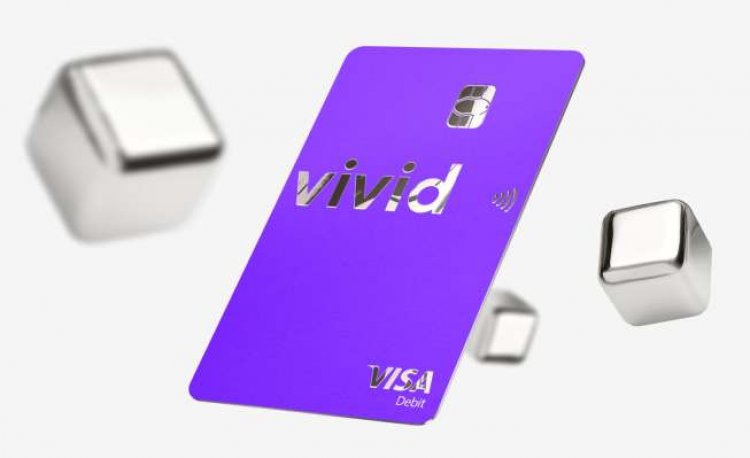Vivid Money, a financial super app, raises $114M at an $886M valuation to expand in Europe
Vivid Money, a challenger bank out of Berlin with 500,000 customers, has made a name for itself with a financial one-stop-shop “super app” that, in addition to basic checking and money management services, also includes stock and cryptocurrency investing. Now, as it gears up to add more services to its platform and expand across all […]

Vivid Money, a challenger bank out of Berlin with 500,000 customers, has made a name for itself with a financial one-stop-shop “super app” that, in addition to basic checking and money management services, also includes stock and cryptocurrency investing. Now, as it gears up to add more services to its platform and expand across all of Europe, the startup has raised €100 million ($114 million), in a round of funding led by Greenoaks Capital with Ribbit Capital and new backer SoftBank Vision Fund 2 also participating.
The funding values Vivd at €775 million ($886 milion at today’s rates). For some context, this is more than double the company’s valuation (€360 million) when it last raised money, a €60 million round in April 2021. Its user base also increased five-fold in that period, and its revenues grew 25x, the company said. Vivid doesn’t share the total amount deposited on its platform, or any details about transaction volumes, but Alexander Emeshev, Vivid’s co-founder, said it is on target to reach 1 million users by the end of this year.
Vivid today is active in four markets — Germany, France, Spain and Italy — and the plan will be to add five more this year, and to be available across all of Europe by the end of 2023. In terms of new products, the company is in the early stages of rolling out insurance offerings, and Emeshev said it will be introducing its first credit products later this year (Vivid currently provides a Visa debit card to users).
Launched in 2020, you could call Vivid a “covid-native” startup, with a mobile-first offering striking the right chord with its 30-something users who had not only been already turning away from traditional banking and investment services, but found themselves spending more time at home due to pandemic and were reconsidering how to manage their financial lives.
As with a number of other neo-banks, Vivid’s basic free banking is built on top of another provider’s infrastructure — in its case, Solarisbank, one of the big embedded finance players in the region. It augments this with more customized money management services that it has built itself — for example, customers can split their money into up to 15 “pockets” based on specific purposes; money can be moved between pockets very easily — and other personalization services.
Alongside those core services, newer waves of financial services involving cryptocurrency and other newer trading formats like exchange-traded funds (ETFs) were also gaining ground, so this was something that Vivid also set out to tap.
“Our vision was to target Continental Europe, a huge market for investment and savings,” said Artem Iamanov, the other co-founder of Vivid Money, in an interview. “We knew that decentralized finance, and other kinds of alternative investment approaches, were booming, and that they were not really connected to the traditional banking world.”
That disconnect was not only in terms of understanding, but also in terms of how to break into newer services when your whole financial life is based in more traditional platforms.
Vivid’s solution has been to create a set of services for users to easily learn about and subsequently invest in stocks and currencies using their existing fiat accounts. It does this by way of a portal that gives a fairly wide range of options — for example it currently has 50 cryptocurrencies from which to choose, along with 3,000 stocks and ETFs — designed to appeal to users who are likely new to the field of decentralized finance and might be trying different things out. (Among those new investment vehicles are also SPACs; Vivid is one of the few platforms that lets ordinary consumers invest in these vehicles in the region.)
“We saw a huge gap between old and new stuff, and so we saw an opportunity to create a super app to give users access to products that intersect between these two worlds,” Iamanov said.
Investing on the platform is free, with Vivid making money on exchange rates and other fees, for example when users invest in U.S. stocks. It also has created a subscription tier that it sells as “Prime” (I wonder how Amazon feels about that), which lets users skip the fees if they pay a flat monthly rate of €9.90.
In a market full of challenger banks — and some very close Vivid competitors such as Sequoia-backed neobroker Trade Republic — Vivid’s backers believe the company’s traction and all-in, easy approach that appeals to new consumer investors will see the company picking up more users and usage as it expands.
“In just over a year, Vivid Money has already built one of Europe’s most beloved consumer banking platforms, allowing users to manage their entire financial lives in a single app. Since we invested last year, we’ve been thrilled to watch their rapid pace of new product development, which has delighted existing users, attracted new customers, and deepened the platform’s value proposition,” said said Patrick Backhouse, partner at Greenoaks, in a statement. “We think we are still in the first innings of a revolution in consumer banking, and we are delighted to further our partnership with Vivid as they continue to scale.”







